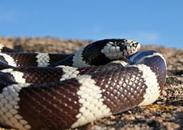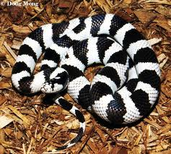California Kingsnake Care (Lampropeltis getula californiae)
Erica Mede, CVT

Natural History
The California kingsnake is a diurnal snakes found throughout the Western United States and down through Mexico. During the hot summers they become more nocturnal and during the cold winter months they will brumate to conserve energy. There are reports that this species has established itself as an invasive species in Gran Carnaria , Spain . This moderately sized snake grows between 2.5-3.5 feet long. These secretive snakes tend to be found along the edge of the desert, in woodlands, farmland, grasslands, hardwood and pine forests as well as residential areas. A truly versatile species! A defensive snake will often shake the end of its tail very similar to a rattlesnake despite having no rattle.
Despite popular belief, kingsnakes are not immune to the venom of native rattlesnakes, but they are resistant to it. Also, these snakes are not necessarily predators of venomous snakes. They are opportunistic feeders and will consume them when available but they do not seek them out.
Feeding
In the wild, these snakes are opportunistic feeding on rodents, snakes, lizards, birds, and frogs. In captivity, these snakes are fed primarily mice. It is recommended that only pre-killed prey be offered as live prey has the potential of severely injuring or killing captive snakes, especially those unaccustomed to live prey. Variety is always encouraged. Feeder anoles and chicks are available commercially. Hatchlings can be fed every 5-7 days. Juveniles should be offered food every 7-10 days and adults fed every 10-14 days.
These snakes tend to go off food during fall and will become restless. Wild caught individuals may require a “cool down” or brumation period to stimulate an appetite again but most will start to eat again without a problem.
Enclosure
Adults are easily kept in a 20-30 gallon glass aquarium with a screen lid. The larger the enclosure the better, a 4 foot snake will likely feel more at home in a 40 gallon breeder tank. Some people have even utilized modified sweater boxes for keeping these snakes especially hatchlings and wild caught specimens which can be quite flighty. Hatchlings can be kept in 10 gallon aquariums.
Substrate
Substrate should ideally be easy to clean. Newspaper, artificial turf such as Reptile Carpet, and paper towel are favorites for hatchlings and new individuals to help monitor fecal output. Most established individuals can be maintained happily on the above or aspen bedding as long as it is agitated frequently and changed every 7-14 days. Never use pine or cedar shavings as the aromatic oils can cause irritation and respiratory issues in your snake. Enrichment can be provided by placing hay, straw, or even dried leaves in the cage for the snake to explore and navigate through. The addition of novel scents and textures is always recommended for their well being.
The California kingsnake is a diurnal snakes found throughout the Western United States and down through Mexico. During the hot summers they become more nocturnal and during the cold winter months they will brumate to conserve energy. There are reports that this species has established itself as an invasive species in Gran Carnaria , Spain . This moderately sized snake grows between 2.5-3.5 feet long. These secretive snakes tend to be found along the edge of the desert, in woodlands, farmland, grasslands, hardwood and pine forests as well as residential areas. A truly versatile species! A defensive snake will often shake the end of its tail very similar to a rattlesnake despite having no rattle.
Despite popular belief, kingsnakes are not immune to the venom of native rattlesnakes, but they are resistant to it. Also, these snakes are not necessarily predators of venomous snakes. They are opportunistic feeders and will consume them when available but they do not seek them out.
Feeding
In the wild, these snakes are opportunistic feeding on rodents, snakes, lizards, birds, and frogs. In captivity, these snakes are fed primarily mice. It is recommended that only pre-killed prey be offered as live prey has the potential of severely injuring or killing captive snakes, especially those unaccustomed to live prey. Variety is always encouraged. Feeder anoles and chicks are available commercially. Hatchlings can be fed every 5-7 days. Juveniles should be offered food every 7-10 days and adults fed every 10-14 days.
These snakes tend to go off food during fall and will become restless. Wild caught individuals may require a “cool down” or brumation period to stimulate an appetite again but most will start to eat again without a problem.
Enclosure
Adults are easily kept in a 20-30 gallon glass aquarium with a screen lid. The larger the enclosure the better, a 4 foot snake will likely feel more at home in a 40 gallon breeder tank. Some people have even utilized modified sweater boxes for keeping these snakes especially hatchlings and wild caught specimens which can be quite flighty. Hatchlings can be kept in 10 gallon aquariums.
Substrate
Substrate should ideally be easy to clean. Newspaper, artificial turf such as Reptile Carpet, and paper towel are favorites for hatchlings and new individuals to help monitor fecal output. Most established individuals can be maintained happily on the above or aspen bedding as long as it is agitated frequently and changed every 7-14 days. Never use pine or cedar shavings as the aromatic oils can cause irritation and respiratory issues in your snake. Enrichment can be provided by placing hay, straw, or even dried leaves in the cage for the snake to explore and navigate through. The addition of novel scents and textures is always recommended for their well being.
 Southern California Kingsnake
Southern California Kingsnake
Temperature
Kingsnakes require an ambient temperature of 80-84°F which is easily provided with under tank heaters, heat tape, heat cable (on the outside of the cage not the inside). The temperatures can be controlled easily with a thermostat and monitored with the use of three thermometers. One thermometer placed on the warm end an inch above the substrate, one placed at the level of the basking site, and another placed an inch above the substrate on the cooler end. A basking site should be 85-88°F but should never exceed 90 °F as they suffer easily from prolonged heat stress. At night, the temperature can drop as low as 75°F.
Humidity
Humidity should be moderate, 35-60%, with the higher end utilized during shedding. Humidity can be monitored with a hygrometer and increased with the use of a large water bowl, fogger, mister, or daily spraying.
Lighting
Although these snakes do not require UVB lighting due to their whole prey diet it is still recommended to offer a ReptiSun 5.0. Avoid keeping your snake by the window as this is not a source of UVB and can result in the death of reptiles due to accidental over heating.
Accessories
Horizontally positioned branches should be offered for climbing as this species enjoys climbing on low level branches in the wild. Natural and artificial foliage can be placed in the cage to increase hiding locations. Hide boxes in the form of half logs, PVC pipes, and half flower pots can be utilized. Rocks can be added texture and for basking areas if they are placed over a heat source and under the basking light to warm the rock.
If you have any questions, please feel free to call us at 847-329-8709.
Kingsnakes require an ambient temperature of 80-84°F which is easily provided with under tank heaters, heat tape, heat cable (on the outside of the cage not the inside). The temperatures can be controlled easily with a thermostat and monitored with the use of three thermometers. One thermometer placed on the warm end an inch above the substrate, one placed at the level of the basking site, and another placed an inch above the substrate on the cooler end. A basking site should be 85-88°F but should never exceed 90 °F as they suffer easily from prolonged heat stress. At night, the temperature can drop as low as 75°F.
Humidity
Humidity should be moderate, 35-60%, with the higher end utilized during shedding. Humidity can be monitored with a hygrometer and increased with the use of a large water bowl, fogger, mister, or daily spraying.
Lighting
Although these snakes do not require UVB lighting due to their whole prey diet it is still recommended to offer a ReptiSun 5.0. Avoid keeping your snake by the window as this is not a source of UVB and can result in the death of reptiles due to accidental over heating.
Accessories
Horizontally positioned branches should be offered for climbing as this species enjoys climbing on low level branches in the wild. Natural and artificial foliage can be placed in the cage to increase hiding locations. Hide boxes in the form of half logs, PVC pipes, and half flower pots can be utilized. Rocks can be added texture and for basking areas if they are placed over a heat source and under the basking light to warm the rock.
If you have any questions, please feel free to call us at 847-329-8709.
